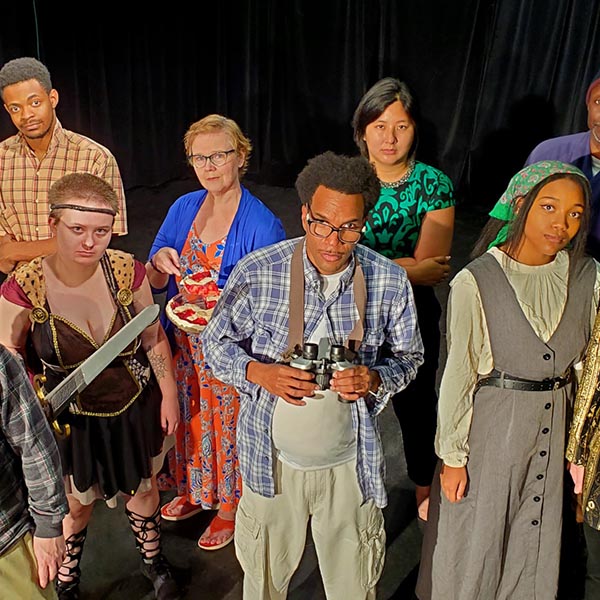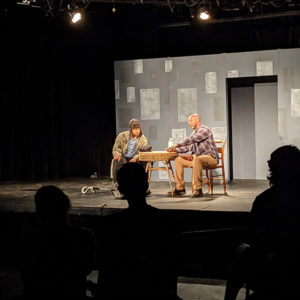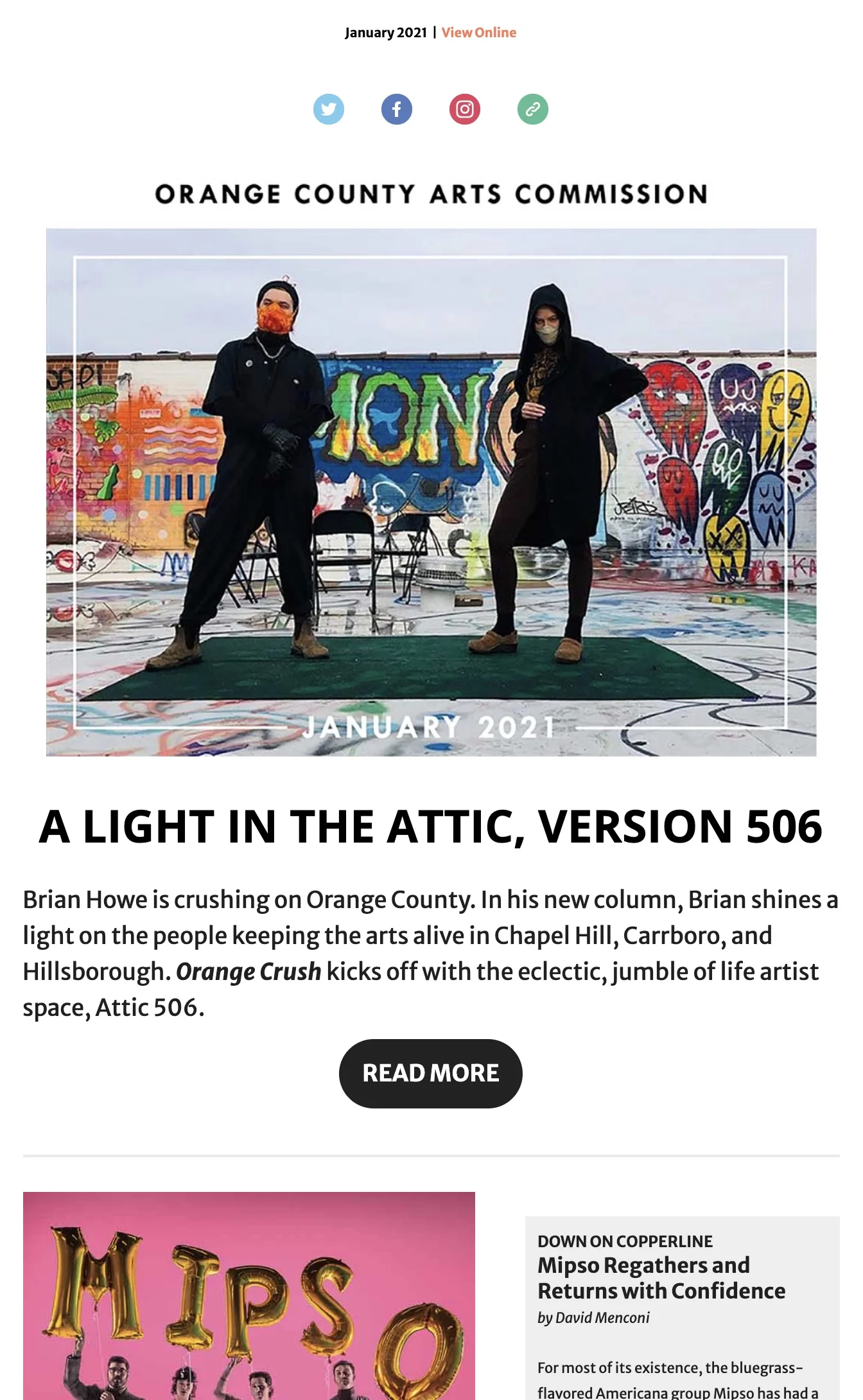
I often make vague resolutions that I am going to do more cultural stuff. You know— take advantage of all the riches the Triangle has to offer. Visit a museum. Attend an art class. See a play. This Saturday, instead of napping or watching TV (good things in their own right, we can all agree), I did just that, attending OdysseyStage Theatre’s “2021 NC 10by10 Play Festival” at The ArtsCenter in Carrboro. The event features ten ten-minute plays written by ten different North Carolina playwrights, staged by ten different actors (who played multiple roles across the various plays), and directed by nine different directors. According to The ArtsCenter’s website: “NC 10by10 has grown to be the most-attended annual short-play festival in the region, and has been produced annually since 2001.”
The plays cluster around a few central themes: climate change, loss, familial relationships, existential angst around coming to terms with circumstances outside of one’s control; some make political commentary about the growing societal obsession with conspiracy theories or the refusal to believe in, and act, according to science. Tonally, the plays range from absurdist metaphor (a video-game-esque warrior battling with a sage but sleepy turtle named “Slippy”); to historical realism (a draft for the Vietnam war); to farcical (a Hollywood director trying to stage an Oscar-worthy performance of a movie called “Little Timmy is Stuck in a Well Again.”)
While all the actors displayed talent and commitment to their roles, Gerald Louis Campbell, with his effortless and deeply human performances, is a standout; he infuses each scene he is in with a sense of pathos, warmth, and gentle humor. In “Digging Out” (written by Vivian Lopez and directed by Karen Dacons-Brock) Campbell plays a widower who mourns the loss of his wife and who yearns to connect with anybody—even a smart-alecky kid who comes to shovel his driveway. Campbell brings this character to life, letting us feel the depth of his loss, as he reminisces over the evenings he and his wife would spend on the porch, gazing at the stars. Campbell is a master of small movements, creating a rich backstory with each swig from a bottle of iced tea; while fiddling with a brown knit cap; or pulling his chair closer to the table to more forcefully make his point. Even when his role is to sit on the side of the stage with a paper bag of takeout while a heated conversation between Satan and God takes place behind him, such as in “When God and the Devil Had Lunch at the Valley Mall Food Court” (written by Teddy Durgin and directed by Noelle Barnard-Azarelo) I admired the gravitas that Campbell leant his character—Henry—over whose soul the two argued. Although the play is largely comedic, with Campbell’s deft characterization, I became quickly invested in Henry’s placid affability: after all, I thought, don’t we all blindly stumble through the days, unaware, or unwilling to acknowledge that death and tragedy are ever-present.
 In “Old Man” (written by Lauren Walker and directed by Danielle Fenton) Campbell gives a poignant performance as aging father, who is at turns exasperating, stubborn, and loving. Campbell is a powerful grounding presence: as his daughter tries to get him to part with items she sees as trash, Campbell delivers the line, “It may be junk, but it’s not worthless,” with such conviction, that the whole emotional resonance of the play crystalizes at that moment. For a performer with such natural talent and charisma, I was shocked to learn that Campbell is a relative newcomer to the theater scene: according to his actor’s bio, Campbell retired from the Air Force and only began acting in 2017, when he “participated in an acting class at Raleigh Little Theater and was instantly hit by the acting bug.” I think big things are in store for Campbell, and I’ll certainly be looking out for future performances that he stars in.
In “Old Man” (written by Lauren Walker and directed by Danielle Fenton) Campbell gives a poignant performance as aging father, who is at turns exasperating, stubborn, and loving. Campbell is a powerful grounding presence: as his daughter tries to get him to part with items she sees as trash, Campbell delivers the line, “It may be junk, but it’s not worthless,” with such conviction, that the whole emotional resonance of the play crystalizes at that moment. For a performer with such natural talent and charisma, I was shocked to learn that Campbell is a relative newcomer to the theater scene: according to his actor’s bio, Campbell retired from the Air Force and only began acting in 2017, when he “participated in an acting class at Raleigh Little Theater and was instantly hit by the acting bug.” I think big things are in store for Campbell, and I’ll certainly be looking out for future performances that he stars in.
My husband, who accompanied me to the event, was struck by “The Wilderness Needs Your Whole Attention” (written by Bonnie Antosh and directed by Grace Siplon) about a young couple, dressed in head-to-toe old-fashioned gray clothing and long-sleeved white shirts, reminiscent of something the Amish would wear. The couple attempts to court each other in a desolate universe populated by “prairie wolves,” mutilated limbs, a strange disease called “milk sickness,” and oddly old-fashioned rules on dating that require strict decorum. Intrigued by the reticence the couple had to show, combined with the tenderness that leaked through despite these strictures, and their melancholy acceptance of the desolation around them, my husband remarked, “I like to see our modern times reflected in art.” Indeed, this was a play where romance, tempered by knowledge, bloomed with subtlety and depth. “This is a hard and doleful country full of death,” one character remarks in deadpan at the onset of the play, to laughter from the crowd. By the end, when this line is repeated, the meaning is greatly changed—full of portent, weight, and hard-won wisdom.
In one of the funniest (and most profane) plays of the evening—“Neighbors” (written by Mark Connell and directed by Annie Taft)—Evit Emerson and Travis Walsh play two increasingly paranoid neighbors whose verbal antics continually up the stakes. In one such laugh out loud moment, while one neighbor dons a rumpled Big Lebowski-esque bathrobe and another clutches a pair of binoculars with manic zeal, they trash talk another neighbor—a jogger whom they deem to be to be suspicious—one of them remarking, “Why is he so paranoid? What’s he up to? What’s he hiding?”
Given ongoing concerns about Covid, I had considered watching the play via the streaming video option that The ArtsCenter offered. After the evening was over, however, I was glad I had opted to attend in person. There is something magical about sitting in a darkened theater, surrounded by other people, waiting to be transported to a different reality. Hearing the laughter and applause of fellow attendees and seeing the performances live, with all the verve and enthusiasm the actors brought, was a special thing.
